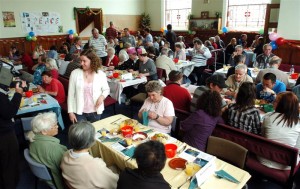Community dinners, the fellowship-fostering events often organized by churches are a nostalgic link to the past when a congregation would financially support members’ activities through chili, pancakes or barbecue. They also, according to CDC’s Rob Tauxe, have created some of the easily traced foodborne illness outbreaks. Like this one in Alabama and this one in North Carolina.
The traditional foodborne outbreak scenario often follows a church supper, family picnic, wedding reception, or other social event. This scenario involves an acute and highly local outbreak, with a high inoculum dose and a high attack rate. The outbreak is typically immediately apparent to those in the local group, who promptly involve medical and public health authorities. The investigation identifies a food-handling error in a small kitchen that occurs shortly before consumption. The solution is also local.
Community dinners can be great fundraisers but are often held at temporary sites and staffed by volunteers unfamiliar with safe food handling practices for large meals.
And sometimes those volunteers are diagnosed with hepatitis A.
According to Paul Merrill at WMTW, Maine Center for Disease Control and Prevention is holding a hepatitis A vaccination clinic for an estimated 100 attendees of a church supper in Durham, Maine.
The Maine CDC said it was investigating a case of hepatitis A and found a person infected with the virus had prepared and served food at the Durham Friends Meetinghouse on Saturday, Sept. 28.
Health officials said that person was also part of a women’s group luncheon affiliated with the meeting house.
The Maine CDC said infected person was also associated with a preschool in Cumberland County, but the exposure happened outside the window where vaccination would be effective (now parents of the kids and other preschool folks wait and see if anyone exposed develops symptoms -ben).
